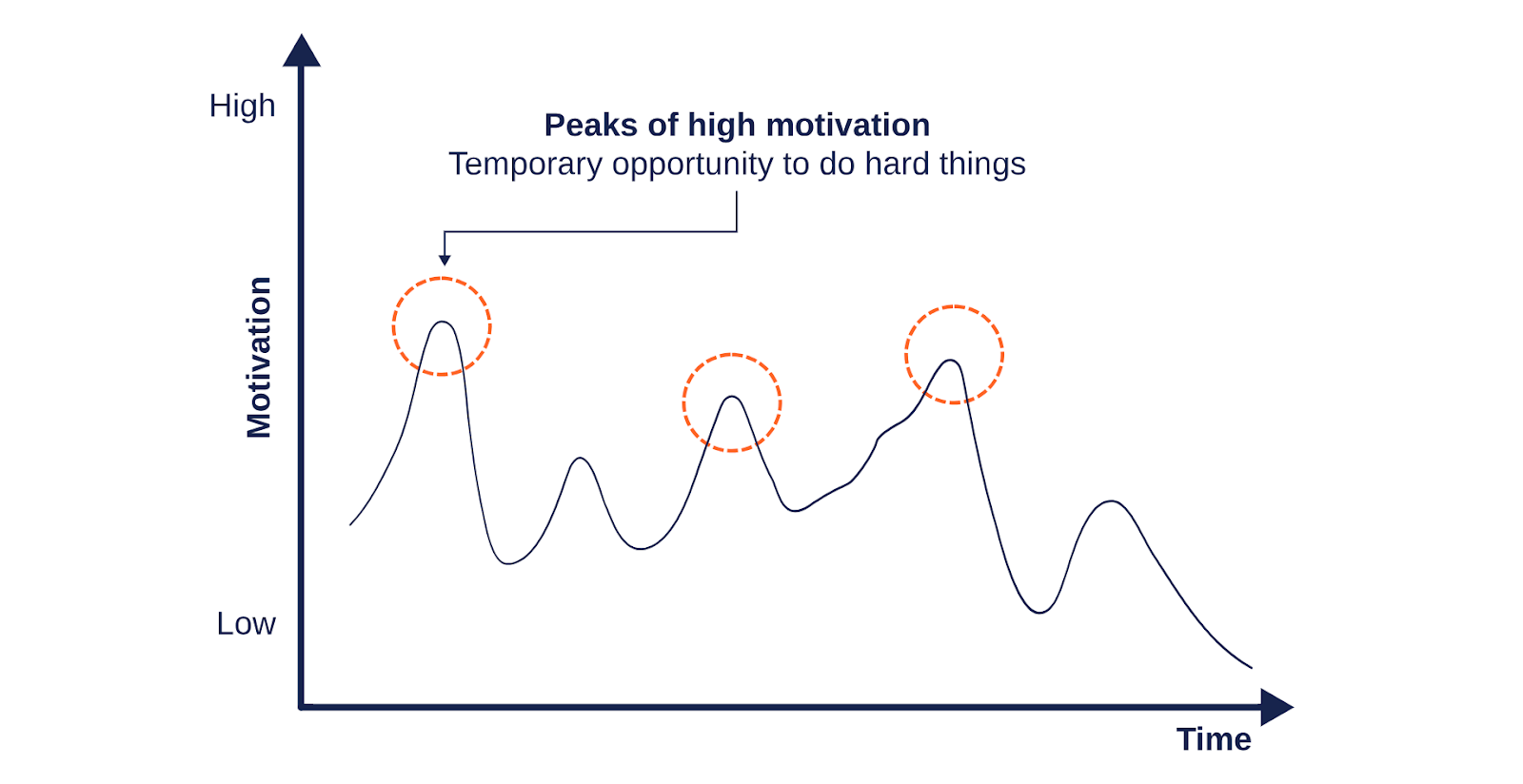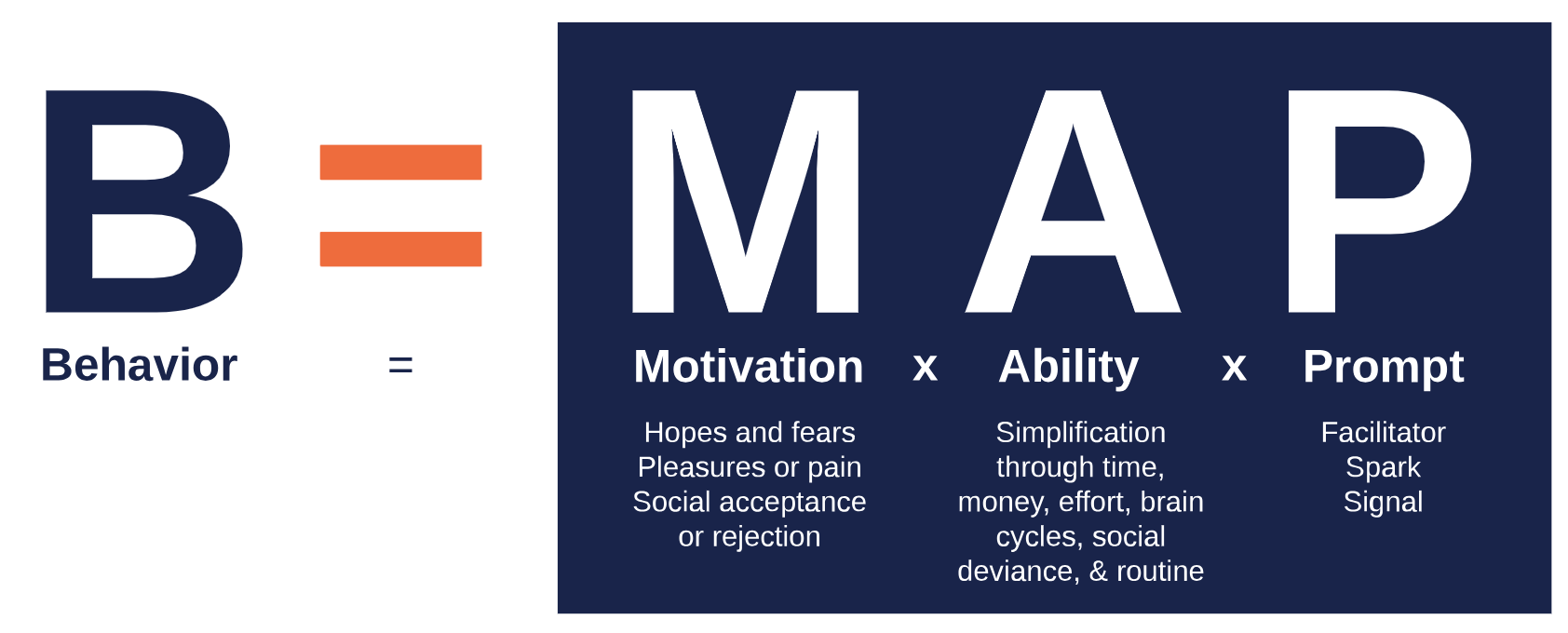How often do you set a goal and then a few weeks later lose motivation to continue? You swore this would be the month you formed a regular morning meditation or picked up guitar again. You set goals of more productivity, sales and collaboration in your team and even mapped out a few techniques to try. So then what happened?
“I’ll begin again tomorrow, I promise!” Maybe you still have a strong motivation to achieve that goal, but you just keep pushing it out. But is it likely that you’ll be less busy tomorrow or another day in the future? It’s okay - this is so common, and we’ve all been there.
Before you go through another cycle of goal setting then guilt and frustration for not carrying on, there’s actually science behind why this happens. While motivation is helpful for getting you going, setting direction and overcoming hurdles. It is poor at keeping you on the right track over the long term. BJ Fogg, habits expert and author of the book Tiny Habits, highlights this in his motivation wave chart below.
“I’ll begin again tomorrow, I promise!” Maybe you still have a strong motivation to achieve that goal, but you just keep pushing it out. But is it likely that you’ll be less busy tomorrow or another day in the future? It’s okay - this is so common, and we’ve all been there.
Before you go through another cycle of goal setting then guilt and frustration for not carrying on, there’s actually science behind why this happens. While motivation is helpful for getting you going, setting direction and overcoming hurdles. It is poor at keeping you on the right track over the long term. BJ Fogg, habits expert and author of the book Tiny Habits, highlights this in his motivation wave chart below.

It is natural for motivation levels to decline over time; with occasional peaks of high motivation when you feel inspired to do hard things. Another model by Fogg suggests that three things need to converge at the same moment in time for behaviour to shift: Motivation x Ability x Prompt. If a desired behaviour does not occur, one of these three elements is missing.

When your motivation is low (which will happen!) you then need to rely on designing effective habits that will continue even when your motivation starts to wane. Fogg created an approach called Tiny Habits.
Tiny Habits are ones that:
The power of tiny habits is that they are sustained even when motivation is at an all time low. While the 30-second part of this approach to habits might seem brief, it challenges the common belief that we need large blocks of time to pursue our goals. In reality, consistent daily effort, even in small increments, is more sustainable and effective. Take reading, for example. Instead of saving it for a lengthy Sunday session, commit to reading just five pages every day. By the end of the week, you'll have read 35 pages—more than you'd likely cover in a single Sunday sitting!
When we come up with excuses about lacking time, it’s not truly about time; it’s about prioritisation. It’s about prioritising your long term goals, over quick immediate wins. Which is the hard part. Even though our long term goals promise significant benefits in the future, such as career advancement and increased earning potential, the journey to achieving them can feel daunting and distant.
We get frustrated when we’re not seeing results right away. Sometimes it feels easier to just ‘fall off the bandwagon’ and try again later. But continually pushing things off can have pretty detrimental compounding consequences. Sure, missing one morning walk or delaying a weekly check-in with your team may not shake the foundation. What about if you skipped every morning walk for the next month and kept pushing out all your team meetings for the quarter? Similarly, the opposite is also true - you can compound positive results from regular small wins – like the health benefits of walking every morning and the collaboration among colleagues by keeping your weekly team check-ins. All of it adds up – both positively and negatively.
Tiny Habits are ones that:
- You do at least once a day
- Take less than 30 seconds
- Require little effort
The power of tiny habits is that they are sustained even when motivation is at an all time low. While the 30-second part of this approach to habits might seem brief, it challenges the common belief that we need large blocks of time to pursue our goals. In reality, consistent daily effort, even in small increments, is more sustainable and effective. Take reading, for example. Instead of saving it for a lengthy Sunday session, commit to reading just five pages every day. By the end of the week, you'll have read 35 pages—more than you'd likely cover in a single Sunday sitting!
When we come up with excuses about lacking time, it’s not truly about time; it’s about prioritisation. It’s about prioritising your long term goals, over quick immediate wins. Which is the hard part. Even though our long term goals promise significant benefits in the future, such as career advancement and increased earning potential, the journey to achieving them can feel daunting and distant.
We get frustrated when we’re not seeing results right away. Sometimes it feels easier to just ‘fall off the bandwagon’ and try again later. But continually pushing things off can have pretty detrimental compounding consequences. Sure, missing one morning walk or delaying a weekly check-in with your team may not shake the foundation. What about if you skipped every morning walk for the next month and kept pushing out all your team meetings for the quarter? Similarly, the opposite is also true - you can compound positive results from regular small wins – like the health benefits of walking every morning and the collaboration among colleagues by keeping your weekly team check-ins. All of it adds up – both positively and negatively.
“How we spend our days is, of course, how we spend our lives,” author Annie Dillard wrote. “What we do with this hour, and that one, is what we are doing.”
- What are your top priorities across all areas of your life?
- Out of all those priorities, what are the most important ones you want to focus on now? (don’t try to hit too many goals at once)
- How do you carve out time for them in your day/week? (**cue Tiny Habits)
- What’s one thing that you spend too much time doing that is not a priority? Consider removing it.
If you’d like to discuss how our LeadMe Academy Leadership Development Programme can help train your leaders to build motivation and better habits in their teams, reach out to us at connect@leadme.academy
Onward and upward,
Jackie

